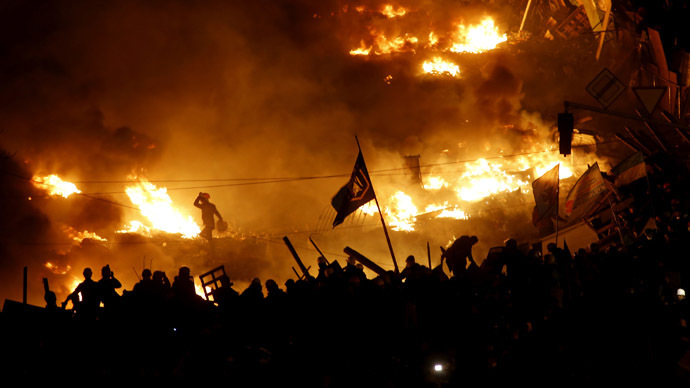Last week RT sought answers to some key questions on Ukraine. Among those who responded was Simon Smith, UK’s Ambassador to Ukraine, on a Foreign and Commonwealth Office blog.
RT welcomes the Ambassador, who coincidentally began tweeting on November 25, to the conversation. Unfortunately his contribution is characterized by denial, not engagement. Have a look.
Why did the opposition oust Yanukovich after he conceded to their demands?
Ambassador Smith: They didn’t. Yanukovich fled Ukraine before fulfilling his commitments under the 21 February agreement. [All spelling and punctuation preserved - RT]
RT: Actually, no. After the ill-fated February 21 deal was signed, the three opposition leaders went to Maidan to sell it. Not everyone was happy.
Renowned Maidan commander Vladimir Parasyuk responded furiously: “We don’t want to see Yanukovich in power. We don’t want deals with them. On Sunday at 10 a.m. he must step down. And unless this morning you come up with a statement demanding that he steps down, then we will take arms and go, I swear.”
Unlike Klitschko’s pitch, Parasyuk’s rebuttal was cheered by the crowd.

There was little doubt. Yanukovich had to flee or the unleashed radicals would deliver on their threat. The opposition leaders couldn’t stop them even if they tried.
Besides the fact Yanukovich fled for his life rather than break the deal, Russia’s point is that the deal was never about keeping him in power. Instead the deal would have ended violence and led to a unity government representing all Ukrainians, “not only those supporting Maidan, but also those skeptical or even fearful of it”.
Why is the coup-appointed government replacing oligarchs linked to Yanukovich with… oligarchs?
Ambassador Smith: Who is appointed by the elected Government of Ukraine is a matter for the people and Government of Ukraine not any other foreign power – either the West or Russia.
RT: Ask Victoria Nuland what is “a matter for the people and Government of Ukraine”?
Regardless, Maidan’s core grievance was the perceived corruption of Yanukovich and his officials, their links to big business who profited from his power abuses, wasn’t it?
If corruption delegitimized Yanukovich so profoundly why is the new government so clearly getting back into bed with the country’s richest men, in Donetsk and Dnepropetrovsk?
Ambassador Smith answers nothing.
Why did the post-coup parliament strip Russian language of its regional status?
Ambassador Smith: This is not the case. President Aleksandr Turchinov refused to sign legislation repealing the existing language law. Instead he recommended drafting a new law addressing the interests of all language groups in Ukraine.
RT: He did. Only after stalling so long that Crimea revolted against Kiev. And it really doesn’t answer our question. Given the ugly language legacy left by Yushchenko and the savage and unchecked violence that brought them to power, the new authorities couldn’t have better alienated Russian Ukrainians, such as those in Crimea
Unlike Turchinov, elected MPs who supposedly represent all Ukrainians, passed the bill. The Party of Regions, predominantly supported in the pro-Russian east and south, held a majority though reduced by resignations. How passing this bill served the interests of their constituency is beyond comprehension.
The MPs who backed changing the status of Russian only added to the xenophobic choir of radicals chanting slogans like “knife the Moskals” (pejorative slang for 'Russians'’) and “whoever does not jump is a Moskal.”
Why did Kiev attack the Constitutional Court?
Ambassador Smith: It is clear that significant parts of the judicial system of Ukraine – including several of the judges in the Constitutional Court – had lost the confidence of the people and legitimate Parliament and Government of Ukraine.
RT: Kiev’s ability to speak for all of Ukraine
is far from established. Nor should any government dedicated to
rule of law attack its own statutes, especially when it comes to
a clear assault on separation of powers.
The new authorities ignore the law when it suits them. They
didn’t bother impeaching Yanukovich properly; it would take too
much time and was by no means a done deal. They didn’t bother to
replace the supposedly corrupt judges as the law intends. Instead
they ordered the judges be prosecuted before any evidence of
wrongdoing was presented.
At least they didn’t propose “just digging up some dirt on them.”
In Russia this approach is called 'revolutionary necessity', and Russia saw plenty of it after the Bolshevik revolution. But the Bolsheviks never denied they took power in an armed coup, as is the case in Ukraine.
Why would the West support the coup in Ukraine?
Ambassador Smith: There was no coup.
RT: Actually, no. Here’s The Free Dictionary:
Coup
1. A brilliantly executed stratagem; a triumph.
2. a. A coup d'état. b. A sudden appropriation of leadership or
power; a takeover: a boardroom coup.
One may argue this was a “democratic coup,” premised on the potentially false assumption Maidan represents the majority of Ukrainian people, but in every sense, Mr. Ambassador, this was a coup.
The statements, views and opinions expressed in this column are solely those of the author and do not necessarily represent those of RT.

